@vanderbiltu Learn more about VU2024’s Haley Bishop via the link in our bio. #fyp
Vanderbilt helped Haley Bishop find her voice and rediscover her passion for running
View this post on Instagram
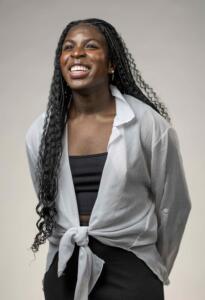
When she was in eighth grade, Haley Bishop noticed a teammate on her track team running in regular sneakers instead of the track-specific spikes that give competitive runners the grip necessary for maximum speed. Rather than thinking it a source of amusement, something to tease them about, she thought about the spikes on her feet—the spikes she was fortunate to take for granted. She told her parents it didn’t seem right, that someone needed to do something. All right, they challenged her. What was her plan?
From those humble origins was born We Set the Pace, a nonprofit organization that Bishop founded in middle school to encourage young people to “use their passion, discover their purpose, and use that knowledge to prepare for the future.” Spikes for the Soul, one of the organization’s earliest and ongoing initiatives, provides new and gently used track spikes to young runners in and around her native Fort Mill and Rock Hill, South Carolina, who are otherwise unable to afford them.
The first year, her organization raised enough in donations to buy seven pairs of spikes. Not so very long after distributing them, a coach told Bishop that one of the recipients had just won the county title.
Who says track and field is an individual sport?
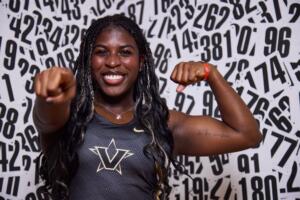
Connectivity has always fascinated Bishop—the way people influence, inspire and interact with one another. At Vanderbilt, the communications studies major learned to find her own voice in life’s conversations.
She also found a community that supported her when the student-athlete qualified for the NCAA Outdoor Track and Field Championships, then endured the frustrations and uncertainty of a lengthy recovery from injury. Because like that county champion she helped to reach new heights, few who stand atop the podium get there without the support of people who cared enough to help them realize the dream.
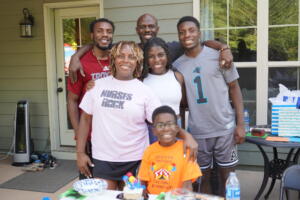 From her family, with parents Heather and Quinset Bishop Sr. still her North Star, to Vanderbilt director of track and field Althea Thomas and assistant coach for sprints and hurdles Cameia Alexander, among a bevy of mentors, Bishop has her team.
From her family, with parents Heather and Quinset Bishop Sr. still her North Star, to Vanderbilt director of track and field Althea Thomas and assistant coach for sprints and hurdles Cameia Alexander, among a bevy of mentors, Bishop has her team.
“When you have other people who believe in you, it helps you start believing in yourself,” Bishop said. “I think all these years, with the village that I have around me, have really helped me grow into who I’m supposed to become.”
Her nonprofit efforts notwithstanding, Bishop arrived at college more comfortable observing communication from the back of the room than leading it. An “introverted extrovert,” as she described herself, she wanted to step beyond her comfort zone. In her first-year writing seminar, The Cold War Struggle to Free Soviet Jews, she quickly found a mentor in Shaul Kelner, associate professor of sociology and Jewish studies.
“He has been my absolute favorite professor,” Bishop said. “As a human being, he’s just such an amazing person, and he always made me feel seen and heard.”
The subject matter was entirely unfamiliar, nothing she had studied before. But Kelner drew her in—and drew out her thoughts. By the end of the semester, she and other students in the class organized a surprise show of gratitude over Zoom.
“I was very shy,” Bishop said. “When I didn’t want to raise my hand, he would call on me. He would foster that uncomfortable growth by calling on me because he knew that I had ideas to share, that I was just too scared to share them.”
No longer reserved, she’s now a podcasting aficionado eager to share her thoughts on matters both consequential and pleasantly mundane. For several years, she and a friend who lives in Rhode Island have hosted semi-regular episodes of the I’m Just Saying podcast, which they describe as “ramblings of our semi-chaotic adult-ish life.”
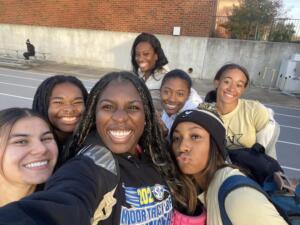 Soon, through her Immersion Vanderbilt project, she will launch a podcast called Just Because. Speaking with current and former college and professional athletes, mental health professionals and others, she hopes to engage in honest and open conversations about issues related to mental health.
Soon, through her Immersion Vanderbilt project, she will launch a podcast called Just Because. Speaking with current and former college and professional athletes, mental health professionals and others, she hopes to engage in honest and open conversations about issues related to mental health.
“It’s geared toward collegiate athletes, but it’s really for everyone because everybody has these silent struggles,” Bishop said. “I found that, in my experience, to see people overcome those hard things just kind of gives you that reminder that it’s not impossible. It might seem impossible in the moment—I’ve been there, done that. But once you see other people saying the tunnel will end, you have to keep going.”
The latest podcast project was partly inspired by a conversation with her younger brother. He marveled one night at how she seemingly “had it all together,” making life and success look almost effortless. She knew it was nothing of the sort.
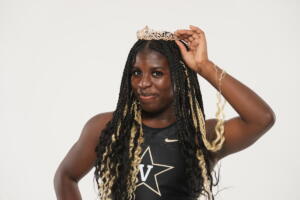
Bishop was indeed an immediate success on the track at Vanderbilt, setting a school record in the 60 meters in her collegiate debut indoors and advancing to the NCAA East Regional in the 100 and 200 meters outdoors.
A year later, she qualified for the NCAA Outdoor Championships and became the first Commodore to score points in the 100 meter at the SEC Outdoor Championships (top individual finishers in each event earn points that count toward team totals).
Then, seemingly at the height of her ascent, she lost her junior year to injury.
Regaining physical health was grueling. She didn’t run competitively for a year and a half. But that process was no more exhausting than the mental challenge of losing such a big part of her identity. Physical and mental, it was akin going through a dark tunnel and trying to find the light, as she put it. Coming out the other side, she found she still had reason to run.
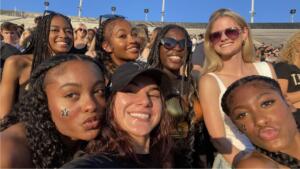 “Being hurt and having time to sit out and really reflect about what I care about in life has really put track back at the forefront of my mind and has really brought my love back to track,” Bishop said. “I remember running on the track for the first time since I was hurt, and I was like, ‘This is just an experience unlike any other.’
“Being hurt and having time to sit out and really reflect about what I care about in life has really put track back at the forefront of my mind and has really brought my love back to track,” Bishop said. “I remember running on the track for the first time since I was hurt, and I was like, ‘This is just an experience unlike any other.’
“It really does kind of revitalize your love for the sport.”
That sport has shown her the power of a village, just as she demonstrates that one person’s voice can make a difference.
“Dare to grow means always challenging yourself and surrounding yourself with people who challenge you. I think the best friends are the people who challenge you to grow and become a better person. Don’t put yourself in super, super uncomfortable situations. Don’t do that. But if you’re a little uncomfortable, uncomfortableness really shows you how to grow. And I think that growing is the best thing that you can do for yourself. When you look back at how far you’ve come, you’re going to be like, “Wow, I never thought that I would be here.” I think if high school Haley saw me today, she’d be like, “You’re so cool.”
“Being a student-athlete can be a lot sometimes, but I would say that the reward is just so great. You come into college with your teammates, who literally become family. All the girls on my team are like my sisters. I love them immensely. And you have such a great support system. It might be scary, and it might be a really big leap of faith, but you’ve just got to trust that it’s all going to work out and it’s all going to turn out amazing. I don’t think I would trade this experience for anything in the world.”
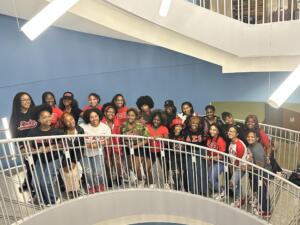 “I am in a sorority, Delta Sigma Theta. I just crossed last spring, so that has been amazing. I grew up with all brothers, so I got 21 line sisters, which is just fantastic. I tell them all the time how grateful I am for them because I’ve always prayed for sisters. I tell them now I have 21 of them. That’s been a really great experience. Greek life has been really fun and rewarding and has helped me grow and allowed me to guide other people to help them grow too.”
“I am in a sorority, Delta Sigma Theta. I just crossed last spring, so that has been amazing. I grew up with all brothers, so I got 21 line sisters, which is just fantastic. I tell them all the time how grateful I am for them because I’ve always prayed for sisters. I tell them now I have 21 of them. That’s been a really great experience. Greek life has been really fun and rewarding and has helped me grow and allowed me to guide other people to help them grow too.”
“The Bishop Joseph Johnson Black Cultural Center has also been tremendously instrumental in finding community within the Black community on campus. I found some of my closest friends in that building!”
@vanderbiltu Learn more about VU2024’s Haley Bishop via the link in our bio. #fyp